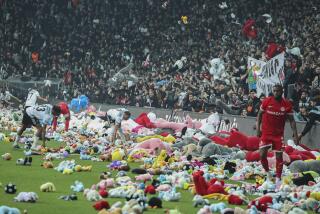Kurds Mourn Loss of Unlikely Hero
- Share via
DIYARBAKIR, Turkey — When gunmen killed the police chief of this largely Kurdish city in January, tens of thousands of Kurds took to the streets in protest. The flood of support for a Turkish official was all the more extraordinary because the police have long been synonymous in Turkey’s Kurdish-dominated regions with brutality and impunity.
During his two years in office, Gaffar Okkan shattered the stereotype, cracking down on police abuses, mingling with locals and, in a groundbreaking move, learning Kurmanji, the most widely spoken Kurdish dialect, which until recently was officially banned.
But above all, it was Okkan’s embrace of a struggling local soccer team that earned him the affection of millions of Kurds.
Okkan had a simple if ambitious plan: to dull Kurdish nationalism with sport. Today, enormous red-and-green-striped banners, the official colors of his adopted team, Diyarbakirspor, festoon lampposts, shop windows and residential apartment blocks across this city in southeastern Turkey.
In May, the team was elevated to the first division known as the “super league,” and fans don’t seem to mind that the team’s rise may owe more to Okkan’s maneuvering than the players’ skill. Today, in the most far-flung corners of this impoverished region, life-size portraits of the slain police chief, lovingly framed, adorn citizens’ walls.
In the garbage-strewn alleyways of Diyarbakir’s Benusan slum district, scruffy Kurdish boys brave 100-degree temperatures to play soccer with an under-inflated plastic ball. “I want to play for Diyarbakirspor when I grow up--that’s my dream,” said Ahmet, 8, flashing a toothy grin.
“I still can’t believe we made it to the super league. We Kurds are so used to losing,” Mehmet Unlu, a 53-year-old street vendor, said as he paused recently for noon prayers at the city’s 11th century mosque.
Unlu’s losses include two teenage sons, who died fighting alongside rebels of the Kurdistan Workers Party. Better known by its Kurdish acronym, PKK, the Marxist group has been waging a brutal campaign for an independent Kurdish homeland since 1984 that has claimed nearly 40,000 lives.
The violence has largely eased since the capture in February 1999 of the PKK’s leader, Abdullah Ocalan. Sentenced to death on treason charges by a Turkish court the same year, Ocalan ordered his men to call off their fight and withdraw to Kurdish-controlled northern Iraq in exchange for his life.
Against this backdrop of burgeoning peace, Okkan launched his campaign with Turkish government leaders to engineer Diyarbakirspor’s promotion to the first division. “We know that referees were told to favor us, that games were fixed,” acknowledged a former club official who asked not to be identified.
“The state wanted Diyarbakirspor to rise to the first division and did a lot to this end,” Emin Colasan, a prominent establishment columnist, wrote in the mass-circulation Hurriyet newspaper. “Some of it happened in the stadium before the eyes of tens of thousands [of spectators].”
Allegations of foul play were amplified when the president of a rival second-division team went public with claims that Diyarbakirspor vigilantes had threatened and beaten his players before a crucial match in May. Only Turkish state television was allowed to film and broadcast the game, which resulted in a hometown victory.
Keen to build on the legacy of Okkan--who authorities say was killed by members of a militant Islamic group--the government recently allocated three plots of land in Diyarbakir to be used as training grounds for the team.
“We are very grateful to the state, but we are determined to remain independent and keep politics out of the game,” club official Mahmut Ucgul said.
That looks unlikely. Spotting a sure vote-getter, Turkey’s largest pro-Kurdish party, the People’s Democracy Party, or Hadep, has begun to funnel generous cash donations to the club. In a recent article published in the pro-PKK daily Ozgur Politika, the jailed Ocalan said, “Diyarbakirspor should strive to bolster democracy in the region.”
The same club supporters who bear life-size posters of Okkan also whistle strains of banned Kurdish nationalist songs before and during matches. And when Diyarbakirspor plays outside the Kurdish provinces, Turkish home crowds typically chant “Ocalan’s bastards” or “PKK go home.”
The twist is that all but two of the club’s players are non-Kurds--and the two Kurdish players have been put on the transfer list ahead of the Aug. 10 start of the new season.
More to Read
Sign up for Essential California
The most important California stories and recommendations in your inbox every morning.
You may occasionally receive promotional content from the Los Angeles Times.












